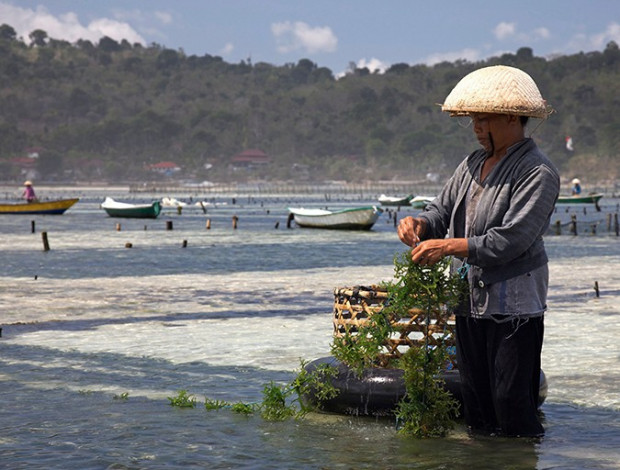
A study has found that
expanding mariculture will be “vital” to ensuring food security, but seafood’s
future hinges on climate action. Photo by Jean-Marie Hullot (Collected).
‘Cultivating finfish
and shellfish may just be the answer to this looming food security challenge’
With the human population projected to reach 10 billion by
the end of the century, the expansion of mariculture will be a “vital step” to
feeding the world, according to a new study published in Nature this month. The
study, which involved an international collaboration of researchers, examined
the potential of a warming ocean to meet the growing global appetite.
Currently, the ocean supplies only 17 percent of the world’s
protein supply, most of it wild-caught. As the study highlights, the ocean
holds great promise to help satisfy the global demand for protein, which is
expected to increase, especially as developing countries grow wealthier.
“Cultivating finfish and shellfish may just be the answer to
this looming food security challenge,” said Dr. Reniel Cabral, co-author and a
Senior Lecturer in Fisheries at James Cook University. “Our study suggests that
by reforming fisheries and expanding sustainable mariculture, current per
capita seafood production can be maintained or increased up to the end of the
century, except under the most severe climate change scenario.”
But meeting the demand for blue foods largely hinges on the
human response to climate change. Global greenhouse gas emissions result in
effects such as ocean warming and acidification – phenomena that are expected
to decrease the ocean’s ability to meet the seafood demands of a growing
population.
“Warming waters are changing where fish can live, what prey
they can eat, and how well they can survive,” said Christopher Free, lead
author of the paper and a researcher in the UC Santa Barbara Bren School of
Environmental Science and Management. “Both fishers and fisheries managers have
to adapt to these changes.”
Fisheries can maintain or increase their yields by adapting
their practices to shifts in the productivity and location of their fish
stocks, the researchers said. However, these necessary reforms alone will be
insufficient to fulfill future demand. Rather, finfish and shellfish farms will
be essential to fill that gap.
“Expansion of sustainable ocean aquaculture could build on
fisheries reforms to increase the availability of healthy and sustainable
seafood to our growing population,” said Halley Froehlich, a co-author of the
paper and an assistant professor at UC Santa Barbara.
According to the study, the expansion of mariculture is
projected to be limited by consumer demand or availability of feed ingredients
derived from wild fisheries, rather than by climate change. For example, with
the appropriate selection of species and location, the researchers found “the
availability of area for profitable finfish mariculture to be insensitive to
changing temperature, oxygenation and salinity.”
Reforming wild fisheries to allow mariculture expansion will
also be an essential step, as some mariculture species still depend on wild
capture fisheries for feed and seedlings.
“Ensuring that wild fisheries are healthy will not only
allow mariculture to expand but will minimize the gap mariculture would have to
fill in seafood production,” said Dr. Reniel Cabral, a senior lecturer at James
Cook University and co-author of the study.
Additionally, because food production by its nature impacts
the environment, the sustainable expansion of mariculture must be conducted
carefully.
“It will require improved governance to ensure best
practices that minimize impacts on ocean ecosystems and encourage equitable
access to this growing industry,” said Willow Battista, co-author and a senior
manager at the Environmental Defense Fund.
But what governance looks like will vary by location. In
highly regulated regions, such as the United States, mariculture regulations
may need to be more well-defined to allow sustainable mariculture to grow. In
less regulated regions, such as China or Thailand, standards will have to be
maintained to “prevent inefficiencies and eco-system degradation.”
Regions where little or no historical mariculture production
exists – as in many of the African nations expected to be hardest hit by
climate change – will have to invest in training and infrastructure.
A key benefit is that effective, efficient mariculture
operations only require a small amount of space. According to the study,
typically 3 percent or less of a country’s exclusive economic zone is required
to meet consumer demand, according to the researchers’ calculations.
“The small space requirement for mariculture leaves ample
room for careful planning to minimize impacts on other ocean industries,” said
Steve Gaines, co-author and dean of the Bren School. Find more.
|Source: Online/KSU
Comment Now